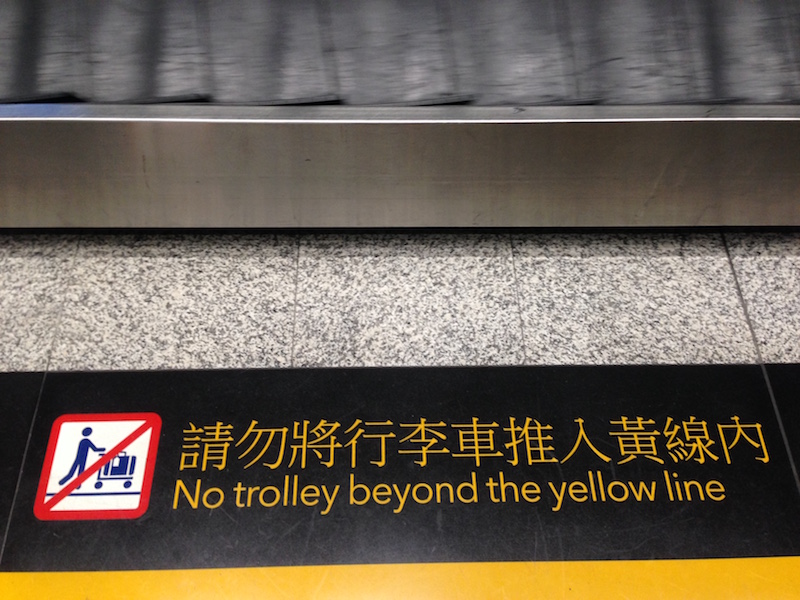Cartographic cacophony
Zach Hershey sent in photographs of a map on the wall of an Ethiopian restaurant on Chestnut Street in Philadelphia. Here's one:
Read the rest of this entry »
Density of information
The first public sign I noticed after arriving at Hong Kong last week was this one embedded in the floor near the conveyor belt (visible at the top of the photo):
Read the rest of this entry »
Big WHAT hall
This Shanghaiist photograph taken at a gym was posted to Facebook by Tristra Newyear Yeager on October 13:
Read the rest of this entry »
Mandarin or Mexican, whichever
I just returned from Hong Kong last night. One of the strongest impressions I bring back from this visit is that the city is becoming even more multilingual than it was in the past. Hong Kong is a global center of finance and business. The number of different languages one hears being spoken on the streets, in restaurants, on buses and trains is simply astonishing. The government has an official policy of three languages (Cantonese, English, and Mandarin) and two scripts (Chinese characters and the Roman alphabet), as discussed in these and other Language Log posts:
- "Cantonese and Mandarin are two different languages " (9/25/15)
- "Hong Kong Multilingualism and Polyscriptalism " (7/26/10)
- "Is Cantonese a language, or a personification of the devil? " (2/9/14)
But the situation has become far more fluid and complex than that.
Read the rest of this entry »
More on "Daesh"
We've had a recent post on the pronunciation of this lightning rod of a word.
"Pronouncing 'Daesh' " (11/15/15)
From a colleague:
Guthrie's article* states:
"And the vowel which begins the word 'islaamiyya' becomes an 'a' sound when differently positioned in a word, hence the acronym being pronounced 'da’ish' when written in Arabic, and the 'a' coming over into our transliteration of the acronym."
Read the rest of this entry »
New frontiers in bullshitology
Gordon Pennycook, James Allan Cheyne, Nathaniel Barr, Derek J. Koehler, & Jonathan A. Fugelsang, "On the reception and detection of pseudo-profound bullshit", Judgment and Decision Making 2015:
Although bullshit is common in everyday life and has attracted attention from philosophers, its reception (critical or ingenuous) has not, to our knowledge, been subject to empirical investigation. Here we focus on pseudo-profound bullshit, which consists of seemingly impressive assertions that are presented as true and meaningful but are actually vacuous. We presented participants with bullshit statements consisting of buzzwords randomly organized into statements with syntactic structure but no discernible meaning (e.g., “Wholeness quiets infinite phenomena”). Across multiple studies, the propensity to judge bullshit statements as profound was associated with a variety of conceptually relevant variables (e.g., intuitive cognitive style, supernatural belief). Parallel associations were less evident among profundity judgments for more conventionally profound (e.g., “A wet person does not fear the rain”) or mundane (e.g., “Newborn babies require constant attention”) statements. These results support the idea that some people are more receptive to this type of bullshit and that detecting it is not merely a matter of indiscriminate skepticism but rather a discernment of deceptive vagueness in otherwise impressive sounding claims. Our results also suggest that a bias toward accepting statements as true may be an important component of pseudo-profound bullshit receptivity.
Read the rest of this entry »
Treasure Language
Steven Bird writes:
After researching some alternatives, I'm trying to get "treasure language" adopted as a way of talking about disappearing or threatened or dying languages. I'm creating a new kind of storytelling event that brings immigrant/diaspora and indigenous communities together.
The first event is scheduled in less than two weeks in Oakland, and features storytelling and word games in Tigrigna, lu Mien, and other small languages spoken in Oakland.
Read the rest of this entry »
Why the Khitan / Liao ruler Abaoji refused to speak Sinitic with his fellow tribesmen
The mighty Liao Dynasty (907-1125) of the Khitans ruled over a vast empire in Northeast Asia and Inner Asia that included Mongolia, Manchuria, parts of the Russian Far East, northern Korea, and northern China.
They spoke a language that is held to be Proto-Mongolic and had two writing systems, known as the large script and the small script. The two writing systems were separate, but seem to have been used simultaneously and continued in use for a while after the fall of the Liao.
The Liao Dynasty was destroyed by the Tungusic Jurchens (ancestors of the Manchus) of the Jin dynasty (1115-1234) in 1125. The remnants of the Khitan established the Qara Khitai (Western Liao dynasty, 1124-1218), which ruled over parts of Central Asia before being defeated by the Mongols.
Read the rest of this entry »
Annals of singular 'they': another case with known sex
Karen Thomson, a Sanskritist and antiquarian bookseller living in Oxford, wrote to me to point out the following very significant example of singular they in a Financial Times interview with TV writer and director Jill Soloway:
People will recognise that just because somebody is masculine, it doesn't mean they have a penis. Just because somebody's feminine, it doesn't mean they have a vagina. That's going to be the evolution over the next five years.
You see what makes this not just a dramatic claim in terms of sexual politics but a linguistically very revealing example?
Read the rest of this entry »
Permalink Comments off
Quinoa: way more than one way to pronounce it
From a colleague:
A question about quinoa. Linguistic, not gustatory or political-economic. How do / would you normally say it?
kee-NO-ah? kwee-NO-ah?
KEE-no-ah? KWEE-no-ah?
KEEN-wah? KWEEN-wah?
keen-WAH? kween-WAH?
(or? )
Read the rest of this entry »
"It didn't fail to disappoint"
A lovely misnegation sent in by David Denison — Kevin Mitchell, "‘There was so much noise’ says Jamie Murray after Davis Cup doubles win", The Guardian 11/28/2015 [emphasis added]:
“There was so much noise,” Jamie said. “It was mental. There’s a low roof as well so everything’s packed in. We were shouting to each other at the baseline trying to tell each other where we were going to serve. But it was brilliant. It’s a Davis Cup final – we expected it to be noisy, a lot of passion and fans out here. It didn’t fail to disappoint.”
Read the rest of this entry »
New evidence for the development of hiragana?
An article by Tomoyoshi Kubo in The Asahi Shimbun, "Poem on 9th-century wood could provide missing link between kanji, hiragana" (11/27/15), may provide evidence for the development of hiragana (cursive syllabary) from Chinese characters.
…The entire verse of famed tanka poem “Naniwazu” was inscribed in ink on Japanese cypress in an intermediary syllabary between manyogana, one of the earliest Japanese writing systems dating back to the fifth century, and hiragana, the Kyoto City Archaeological Research Institute said on Nov. 26….
The kanji were originally semantic but were read phonetically to suit the Japanese language.
The characters were later simplified and turned into hiragana, but the process of that transformation remains a mystery.
The writing on the latest discovery is neither manyogana nor hiragana, but something in between, the institute said. It is also the first finding of the entire poem written in the intermediary system….
Read the rest of this entry »



